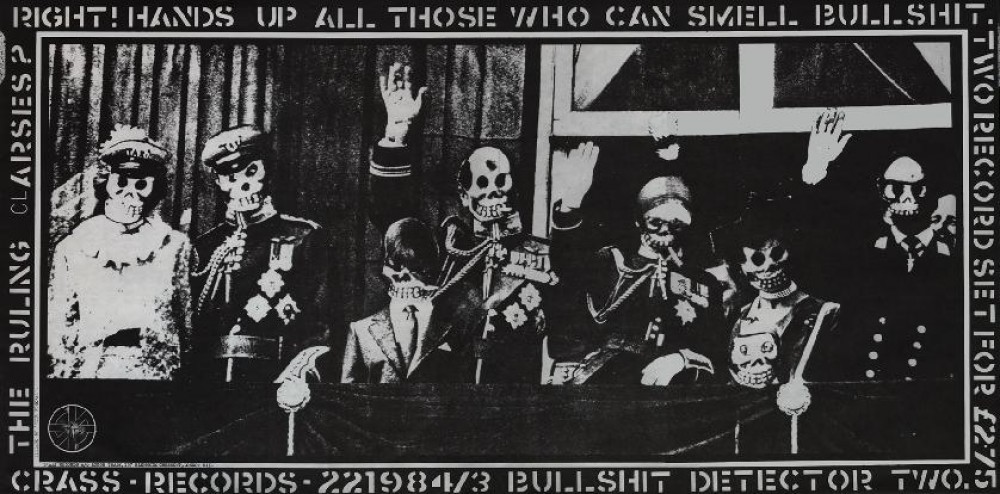I have recently completed and submitted a co-authored book chapter on anarcho-punk fanzines with my colleague and PhD advisor Prof Tim Wall. The chapter is for a forthcoming book Punk, Politics and Resistance: Fight Back edited by Matt Worley from Reading University.
Punk Fanzines– ‘symbols of defiance’ from the print to the digital age
In September 2011 I presented a paper on punk fanzines, and their migration from print to the online environment, at The Subcultures, Popular Music and Social Change Conference hosted by London Metropolitan University. After the conference Matt Worley of Reading University, who hosted the punk panel at the conference, approached me and a number of other academics, who presented punk based research at the conference, with a proposal to get our work published in a book. Over the past year or so Matt has secured a publishing deal with Manchester University Press for a forthcoming book called Punk, Politics and Resistance
I decided that after my chapter on punk documentaries didn’t quite make the final print of Ben Halligan’s book “Sights and Sounds: Interrogating the Music Documentary”, and as an early career researcher with little publication experience, I would enlist the help of fellow research colleague and head of our centre for research Tim Wall to co-author the chapter as he has much experience in getting articles and chapters published. I also recognised that Tim would not only bring a wealth of experience but also a c corpus of knowledge around popular music culture and the digital age from his work on Jazz in the digital age and other research projects he has been and is involved in. We have recently had confirmation from Matt Worley that the chapter will make the publication and Tim and I are in the final stages of making some minor alterations based on comments from the editor and peer reviewers.
The chapter is titled “Punk ‘zines – ‘symbols of defiance’ from the print to the digital age”
and as I mentioned at the beginning of this post is based around an exploration of the development of punk fanzines from the late 1970s to the present, exploring the role of these music fan-produced publications in giving meaning to the experience of a music community. Our aim was to consider and analyse the fanzine as a discursive practice. In doing so we set out to encompass the usual emphasis on fanzines as channels of communication and symbols of wider punk practices, but to ensure we recognised that it was the fanzine which was one of the key ways in which punk and anarcho-punk was made meaningful. In doing so we argued that
· fanzines became one of punk’s many ‘symbols of defiance’, not just in the way that they visually and verbally represented punk’s DIY ethos and activism, but also in the way they embodied the labour of ‘fan-eds’ as organic intellectuals undertaking ideological work in which discourses of defiance and opposition are constructed, signified and reinforced.
To enable this we focussed on two particular instances of the punk ‘zine; two moments in which the specific meanings of specific fanzines could be explored in a little greater detail than those offered in the grander narratives of the punk fanzine. In the first instance we conducted a case study of one early 1980s anarcho-punk fanzine and examined the way that such publications operated at the intersection of political activism and DIY music criticism, constructing idealised notions of music, politics and community against which the actual activity within local punk scenes were judged.
This for me was particularly interesting and nostalgic as I referred to copies of anarcho-punk fanzines from my personal collection from over 30 years ago. Many of these such as ‘Acts of Defiance’, which formed the basis of our case study, ‘Mucilage’ , ‘Guilty of What’ and ‘Necrology’? I hadn’t looked through for at least 20+ years. Without getting too nostalgic the experience brought back many fond memories from my youth and also made me consider how those fanzines informed and developed my own political position. More interestingly it also made be consider and reassess how those politics now inform my life as it could be argued that being in academia is being part of the ‘system’ that I was very much rallying against in my youth.
Anyway I digress so back to the chapter. In the second instance we examined the idea of the punk ‘zine as used in contemporary websites with a focus on punk from the 70s or 80s, or music or artists that continue its ethos and/or sound.
Without giving too much away, as we would like you too read the chapter when the book is published, we argued that simply focusing on the characteristic visual deign of the print fanzine limits our understanding of its cultural role and the position of its ‘fan-ed’ cultural agents. This important point also allows us to understand the extent to which webzines replicate the discursive practices of the print fanzine. Overall, while many web sites or blogs may include visual references to fanzines, and may even use the term in their titles or primary banners, they do not include the sorts of editorial organisation, the cultural practices or the discursive constructions of identity and opposition which characterised print fanzines.
I am really pleased with the chapter and really enjoyed the experience of co-authoring, the support it enables and the different perspectives that another author can bring to the ‘mix’. This work on examining anarcho-punk fanzines has led to me developing some of those core ideas further for another chapter called “From Protest to Resistance: British anarcho-punk fanzines (1980-1984) as sites of resistance and symbols of defiance”, which will appear in a seminal book on anarcho-punk called “The Aesthetic of Our Anger: Anarcho-Punk, Politics and Music, 1979-84” co edited by Mike Dines and Matt Worley due for publication by Autonomedia In early 2015.
